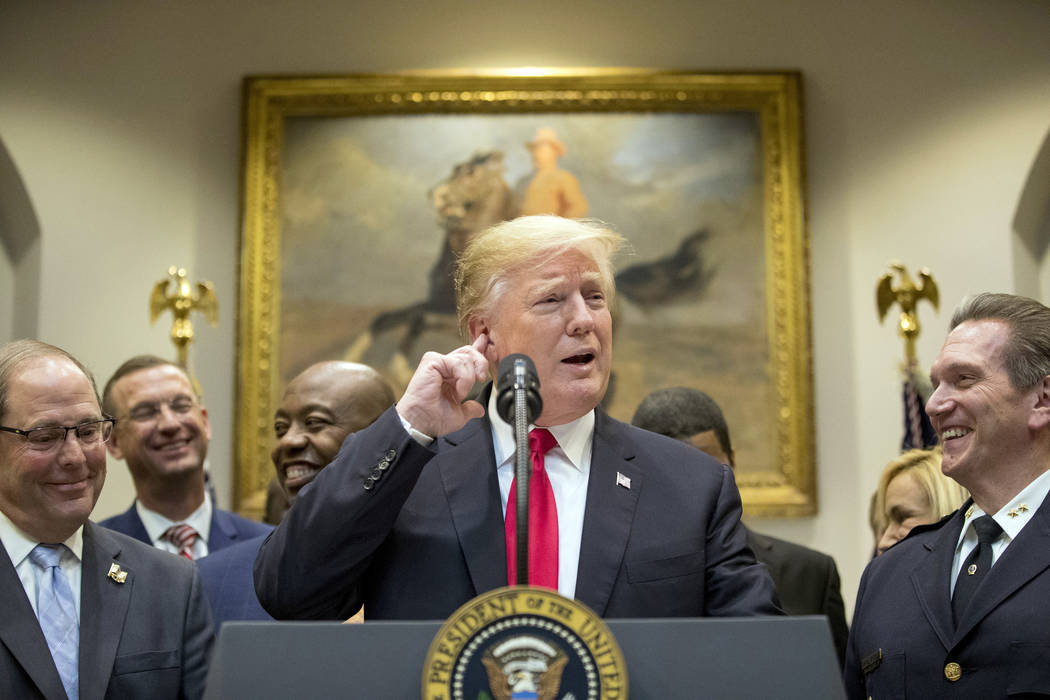Trump backs major rewrite of federal sentencing laws
WASHINGTON — President Donald Trump embraced federal criminal sentencing reform Wednesday as he announced his support for bipartisan legislation to help released inmates re-enter society, but with a new twist.
In a sharp policy change, Trump announced that he will support a prison reform bill, called the First Step Act, with sentencing reforms that would increase judicial discretion, end the “stacking” regulation that enhances sentences for crimes committed while possessing a gun, and reduce sentences for nonviolent low-level offenders.
Surrounded by members of Congress, as well as leaders from law enforcement and think tanks, Trump congratulated members for “working together with my administration over the last two years” to reach a bipartisan agreement.
But there was not a Democrat from Congress in the room — a sign that may not bode well for the measure’s passage.
Sen. Dick Durbin, D-Ill., a proponent of sentencing reform, and Sen. Chuck Grassley, R-Iowa, did send out a message that praised Trump’s support for prison and sentencing reform, but Durbin did not attend the event. A White House official told reporters afterwards that the administration does not expect many lawmakers to endorse the bill now because the exact language has not been released.
During his State of the Union address, Trump said that he would “embark on reforming our prisons to help former inmates who have served their time get a second chance.” It is a subject he frequently brought up during midterm campaign rallies.
The First Step Act, sponsored by Rep. Doug Collins, R-Ga., and co-sponsored by Rep. Hakeem Jeffries, D-N.Y., would direct federal prison officials to set up personalized plans for inmates that could include vocational training, substance abuse treatment and mental health care.
“This is actually how legislation’s supposed to happen,” Collins told the Review-Journal.
Bill stalled in Senate
The Collins-Jeffries bill passed the House by a 360-59 vote in May, but stalled in the Senate as advocates demanded sentencing reform. In the House, many Democrats voted against the bill because they did not think it went far enough — in part because the law-and-order Trump opposed sentencing reductions.
Republicans are convinced that sentencing reform can pass both houses only if Trump shows himself to be solidly behind it, Pat Nolan, director of the American Conservative Union Foundation’s Center for Criminal Justice Reform, told the Review-Journal.
Senate Majority Leader Mitch McConnell, R-Ky., has said he will push for a vote during the lame-duck session if he can find the 60 votes needed to bring a bill to the floor.
The driving force behind the announcement is Jared Kushner, Trump’s son-in-law and senior adviser, who was hailed by the president when he entered the Roosevelt Room. In 2005, Kushner’s father, a real-estate magnate, was sentenced to two years in federal prison after he pleaded guilty to tax evasion, witness tampering and illegal campaign donations.
The administration’s most stalwart opponent of sentencing reform was Attorney General Jeff Sessions, who resigned under pressure last week. Acting Attorney General Matthew Whitaker is said to support sentencing reform.
Another factor in Trump’s change of heart was a statement by the National Fraternal Order of Police in support for “certain sentencing reforms” contained in the bill. The 345,000 member organization endorsed Trump in 2016.
“He kept hearing that law enforcement was opposed,” said Nolan, whose center was one of many advocacy groups that worked with Kushner. Trump “did not want to upset his base within the law enforcement community.”
First reform since 2010
Molly Gill, vice president of policy for Families Against Mandatory Minimums, said the measure could be the first mandatory-minimum sentencing reform to be passed since 2010 when President Barack Obama signed the Fair Sentencing Act. That measure reduced the disparity in the mandatory minimum sentences applied to possession of crack cocaine and possession of powder cocaine.
Before the 2010 law, an offender with five grams of crack cocaine — about the size of a candy bar — faced 10 years in prison, the same sentence that applied to 5,000 grams of powder cocaine. The longer sentences for crack cocaine offenders fell disproportionately on African-Americans, according to the U.S. Sentencing Commission.
The Fair Sentencing Act reduced the disparity to 18-1, but did not apply retroactively. The new proposed First Step Act would eliminate the disparity and apply it to inmates sentenced previously.
“Thousands of people are sitting in jail doing those pre-2010 sentences and they don’t have any relief until Congress acts,” said Gill. If Congress can push through the measure this week, it would be “an incredible Christmas present” for these inmates and their families.
Nolan, a former Republican California state lawmaker who served 29 months in prison after pleading guilty to racketeering, called the bill “the first step.”
“This has shown the Republicans they can deal with this and there’s not political suicide,” he said. “Instead it’s doing the right thing and this will help them.”
But Larry Leiser, president of the National Association of Assistant U.S. Attorneys, said his group considered it “most unfortunate” that Trump had been “misled into believing that this bill is going to advance the interests of law-abiding citizens of his country.” His group estimates its passage would lead to the “immediate release” of 4,000 convicted felons.
Contact Debra J. Saunders at dsaunders@reviewjournal.com or 202-662-7391. Follow @DebraJSaunders on Twitter.
In his words
In October, President Donald Trump told "Fox & Friends" that if his then Attorney General Jeff Sessions did not back sentencing reform, "he gets overruled by me."
"There has to be a reform because it's very unfair right now," Trump added. "It's very unfair to African-Americans. It's very unfair to everybody. And it's also very costly."























